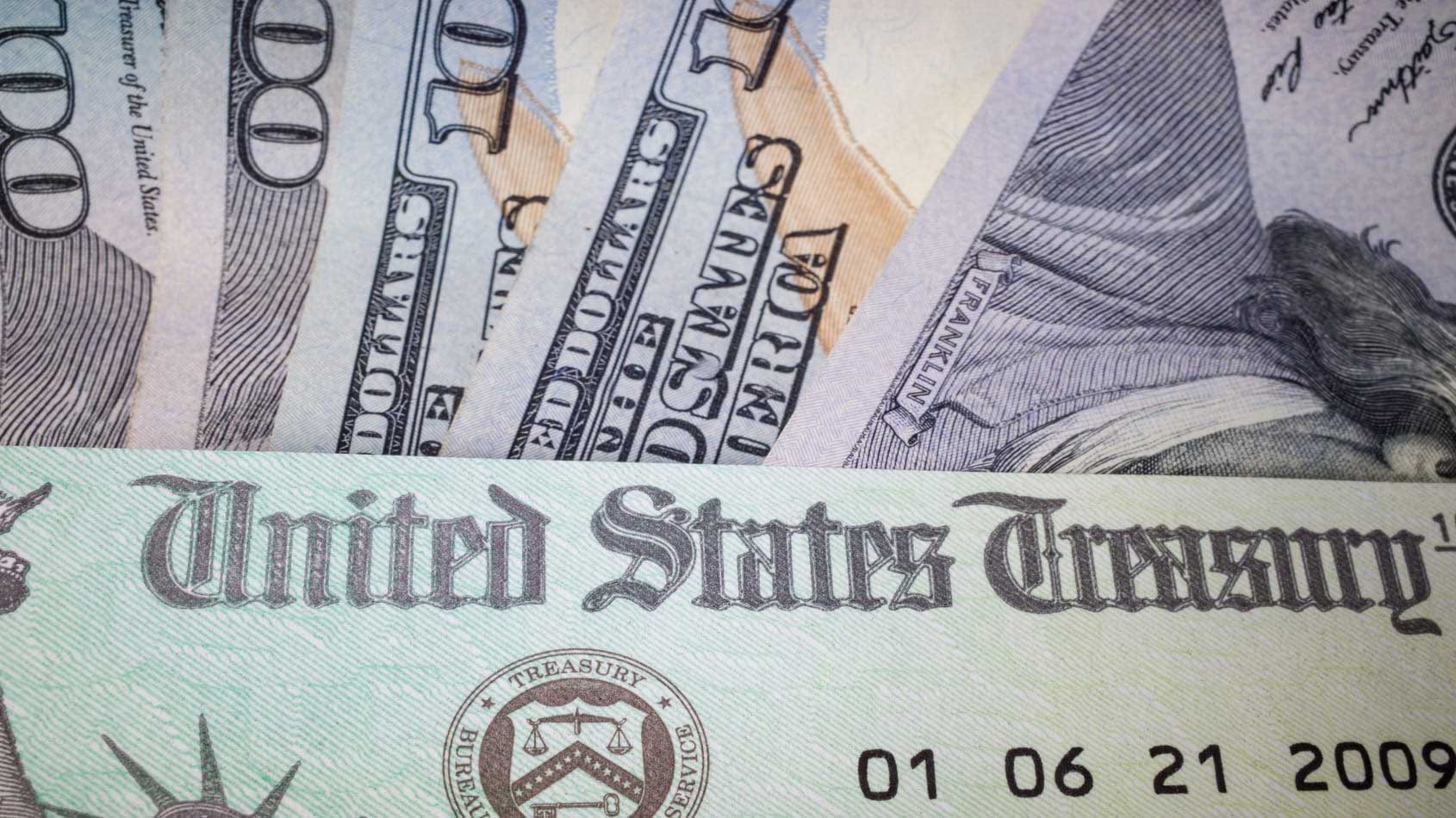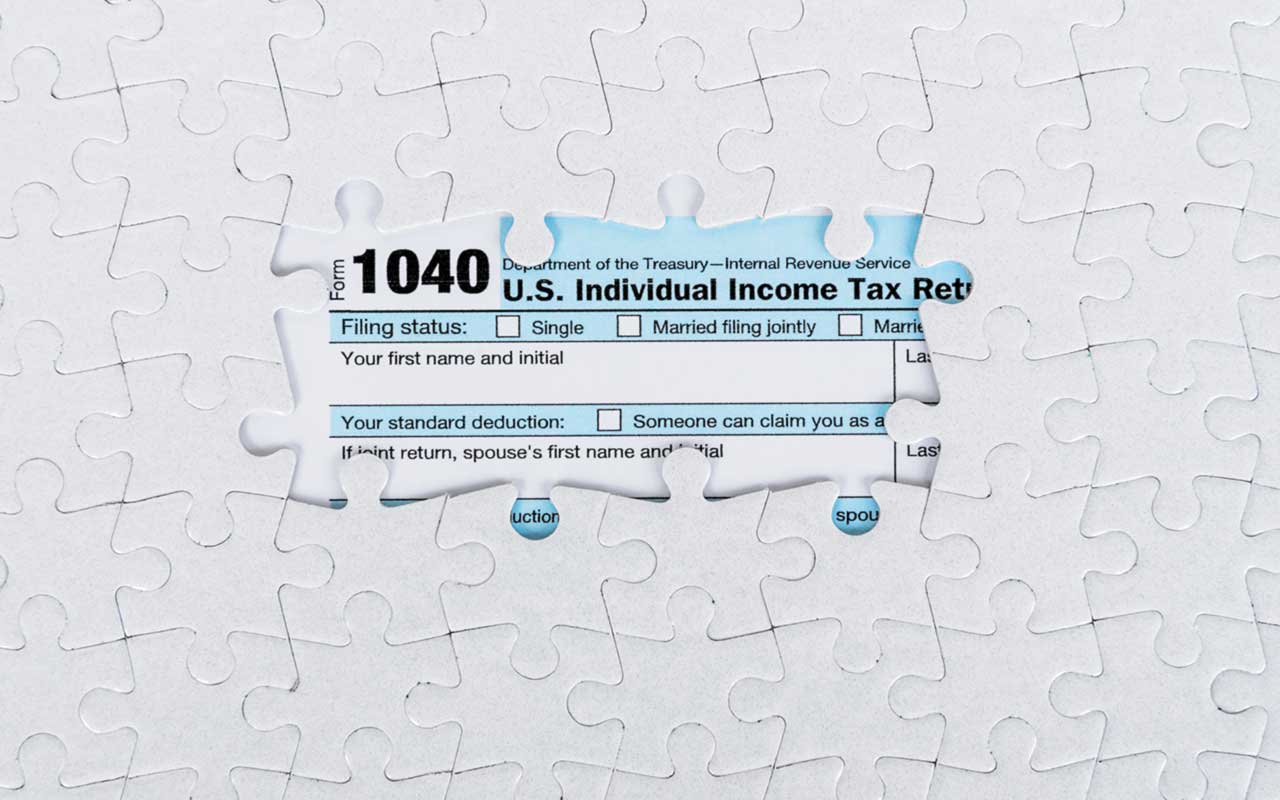Why It Pays to File Your Taxes Now
It's tax season, and co-host Sandy Block explains why taxpayers should file sooner rather than later. Then, she and fellow co-host Ryan Ermey discuss holiday debt hangover and share more wacky PR pitches. This leads the pair to dish on virtual pawn shops and meaningless market indicators.

Profit and prosper with the best of Kiplinger's advice on investing, taxes, retirement, personal finance and much more. Delivered daily. Enter your email in the box and click Sign Me Up.
You are now subscribed
Your newsletter sign-up was successful
Want to add more newsletters?

Delivered daily
Kiplinger Today
Profit and prosper with the best of Kiplinger's advice on investing, taxes, retirement, personal finance and much more delivered daily. Smart money moves start here.

Sent five days a week
Kiplinger A Step Ahead
Get practical help to make better financial decisions in your everyday life, from spending to savings on top deals.

Delivered daily
Kiplinger Closing Bell
Get today's biggest financial and investing headlines delivered to your inbox every day the U.S. stock market is open.

Sent twice a week
Kiplinger Adviser Intel
Financial pros across the country share best practices and fresh tactics to preserve and grow your wealth.

Delivered weekly
Kiplinger Tax Tips
Trim your federal and state tax bills with practical tax-planning and tax-cutting strategies.

Sent twice a week
Kiplinger Retirement Tips
Your twice-a-week guide to planning and enjoying a financially secure and richly rewarding retirement

Sent bimonthly.
Kiplinger Adviser Angle
Insights for advisers, wealth managers and other financial professionals.

Sent twice a week
Kiplinger Investing Weekly
Your twice-a-week roundup of promising stocks, funds, companies and industries you should consider, ones you should avoid, and why.

Sent weekly for six weeks
Kiplinger Invest for Retirement
Your step-by-step six-part series on how to invest for retirement, from devising a successful strategy to exactly which investments to choose.
Ryan: It's the most wonderful time of the year. Well, for Sandy anyway. Tax season is underway and today's episode is the first of many that will guide you all the way through April 15th. We talk collecting documents and filing early in our main segment.
- Episode Length: 00:28:02
- Links and resources mentioned in this episode
- SUBSCRIBE: Apple Google Play Spotify Overcast RSS
Ryan: On today's show we also discuss how to deal with a holiday debt hangover and delve back into our craziest PR pitches. That's all ahead on this episode of Your Money's Worth. Stick around.
Ryan: Welcome to Your Money's Worth. I'm Kiplinger staff writer Ryan Ermey joined, as always, by senior editor Sandy Block. And, Sandy, it's your favorite time of the year. It's tax season.
From just $107.88 $24.99 for Kiplinger Personal Finance
Become a smarter, better informed investor. Subscribe from just $107.88 $24.99, plus get up to 4 Special Issues

Sign up for Kiplinger’s Free Newsletters
Profit and prosper with the best of expert advice on investing, taxes, retirement, personal finance and more - straight to your e-mail.
Profit and prosper with the best of expert advice - straight to your e-mail.
Sandy: It's tax time. I'm stoked!
Ryan: So our main topic is going to be the first of many discussions that you and I will have about filing your taxes. But first we wanted to talk about something since we're still not that far removed from the holiday season and it's that some people may be at risk of experiencing what we're calling a debt hangover.
Sandy: Right, Ryan. And this happens, I don't know if this has happened to you but when you go shopping at a department store people are so eager to get you to open a credit card, a store card.
Ryan: Right.
Sandy: And oftentimes they'll say you get, you know, 10% off which is nice. And the other thing that a lot of retailer credit cards push is deferred interest plans. Basically they'll say you put your purchases on this credit card and you don't have to pay any interest for six months. And who could say no to a no interest loan?
Ryan: Exactly.
Sandy: But you really got to read the fine print on this and this is where the debt hangover comes in. Because here's the problem, if you don't pay off the entire balance by the time that special offer expires, which often can be in as little as six months, they will charge you retroactive interest for the entire time. And retail credit card interest rates are typically five percentage points or more higher than a general interest credit card. In addition, if you miss a minimum payment even by a couple days then that retroactive interest kicks in. So our advice is if you're going to get a refund and we'll talk soon about how you can make that happen.
Ryan: Woo-hoo.
Sandy: Excellent use for the money is to pay off these credit cards, get rid of this problem before it becomes a really big problem. And going forward we really recommend staying away from retail credit cards because the interest rate is higher, the amount of credit that you can get is lower and oftentimes you can do just as well or better with a general interest rewards card.
Sandy: A general interest credit card oftentimes has rewards. It doesn't have these retroactive time bombs that come back to hit you. So in the future when you're shopping I would really recommend resisting the temptation to take out a retail credit card unless you have the money to pay it off right away in which case, sure, maybe you want to take the discount and then pay it off. But that's usually not why people take out these credit cards.
Ryan: And you know there's more than one way to have a debt hangover. Even if you haven't bought into one of these cards it's quite possible that maybe you spent a little bit beyond your means on a regular credit card over the holiday season. Maybe you've let a little bit of a balance pile up on a credit card that you really can't afford to pay down at the moment. What should be the strategy for people who are in that situation?
Sandy: There are some good deals on balance transfers. Some credit cards will give you, and again these are general interest credit cards not retail credit cards, they'll give you 15 to 18 months, no interest, if you transfer your balance to that credit card. And oftentimes they'll have rewards too. Now again, the thing you have to watch out with is you got to put a big circle on your calendar for when that balance has to be paid off because if you don't, again, you could be hit with retroactive charges and a really big problem.
Sandy: But if you are just trying to buy yourself a little bit more time and you know the money's coming, you know a balance transfer could give you some time. You need to have decent credit to get these but we have some good information on our website about top rewards cards and oftentimes the top rewards cards include good balance transfer offers. Creditcards.com, our friends there have some good lists of good balance transfer cards. So look into that but again, this is a short-term solution. It's not a long-term problem for overusing credit cards and having too much debt. Because eventually you do have to pay.
Ryan: Yes. So we'll have a list of all of the cards that we're talking about in our show notes and so go check those out. And, yeah, like you said, it's not a long-term solution but if you just need to cool the debt down a little bit, buy yourself a little bit more time to get it taken care of and avoid a major headache, this could be a good way to go.
Ryan: Coming up Sandy tells us how to get that tax refund as early as possible. Don't go anywhere.
Ryan: All right, we're back. And today's main topic is taxes. As of January 28th tax season is officially on and that was looking a little bit fraught there for a moment, right?
Sandy: That's right. When the government was shut down, even though the IRS people were supposed to go back to work, I think some of them weren't. And there was a lot of concerns about whether the tax season would start on time and whether refunds would be delayed.
Ryan: So we made it. And so what is the advice when it comes to at least the timing of filing one's taxes?
Sandy: We generally advise people to file as soon as possible. And there's a couple reasons for this. One is obviously most people get a refund. The sooner you file, the sooner you get your money.
Ryan: Get your money.
Sandy: Nothing wrong with that. But I think a bigger reason and this applies even if you're not expecting a really big refund is it protects you from refund identity theft. What these scammers do is they steal social security numbers. They file fake tax returns in your name and claim your refund. Now the IRS has cracked down on this and I think it's harder to do than it used to. But it's still a problem. And if you file your taxes and you claimed your refund they can't take it from you. They can't. They'll file a fake return and it'll just bounce right back.
Ryan: Right, because you've gotten to it first.
Sandy: You've gotten the money and you've pocketed it. If someone steals your refund it's not gone forever but it can be a real pain to go get it. You have to prove that somebody took it, you have to, you know ... It could be months before you get your money.
Ryan: Right.
Sandy: So file now. Get your money. Don't worry about it.
Ryan: All right. Well, so, people's documents are coming in. I got my W-2 today actually. So what, as you're collecting your documents and I mean some people I know save receipts, some people just have ... My father has like drawers full of stuff. I have like a folder full of things. So what should people be getting together if they're going to try to file as soon as possible?
Sandy: Well, the basic things that you need is, as you mentioned, your W-2. If you work for someone else they're supposed to give you your W-2 by January 31st which is why we have ours. So your W-2 is basically a record of how much you made last year. And that's kind of the basic form for tax returns. So that's the first thing. And you should have that. If you didn't get it, talk to your employer and find out why. And the IRS also has some instructions on what to do if you didn't get one.
Ryan: Okay.
Sandy: So that's the main one. The other forms have to do with mainly your investments and any other sort of gig income. If you had a side gig or did some freelancing or consulting you should have gotten a 1099-MISC. 1099-MISC. This is nonemployee compensation. You should receive it from anyone who paid you $600 or more in 2018. You should file this because the employer probably did and the IRS will wonder why you didn't. So that's a form you need. And that again you should get by January 31st.
Sandy: Then there are the forms that you get from your financial institutions. Typically this is a 1099-INT which shows interest, a 1099-DIV which comes from your brokerage firms and shows the amount of dividends paid to you, and if you sold any stocks or mutual funds in 2018 you're going to get a 1099-B reporting your capital gains. So these are all in your taxable accounts. In your IRAs and your 401(k)s, that's all tax deferred so you won't be getting those for those. But from your taxable accounts.
Sandy: Those don't come until February 15th. So if you have a lot of investments you may not be able to file right now. Oftentimes, I don't know if that's going to be the case this year but I've heard of cases where people filed and then got a stray 1099-B and ended up having to amend their return which can be a real pain. So make sure you've got all of these before you file. But you should get them by mid-February. And then you can ... And again, these things are all reported to the IRS so you don't want to file a tax return that doesn't have this information because the IRS matches what it gets from you with what it gets from your institutions, your financial institutions, employers and things like that. You don't want to send them a form that excludes some of this important information.
Sandy: The final one I'll mention is a 1099-R. This is distributions from retirements accounts. Say you rolled over a 401K to an IRA last year. Now that's not taxable but you do want to report it because if you don't the IRS may think that you took it out.
Ryan: Oh, I see.
Sandy: So this again is one that you should get from your financial institution. If you're doing a software program it'll ask you if you have one of these. So that's another one. And there's a few other forms that we can mention on our show notes but I think those are the main ones that you're going to want to get together.
Sandy: The other thing you're going to need, as you mentioned with your father, is receipts for charitable contributions, your mortgage interest, your property taxes. Going forward you may not need this information because the big difference, the big thing that is happening this year is the tax overhaul which nearly doubled the standard deduction for tax payers. The majority of tax payers will no longer itemize. But this is the first year that this law has been in effect. So you're not going to know until you file your taxes whether you're going to continue to itemize or not.
Ryan: Right.
Sandy: So you're going to need all this stuff because especially in, I think we talked about this in an earlier episode, if you're kind of on the threshold, maybe you have a lot of mortgage interest, really high property taxes and some charitable contributions, you want to make sure that you have all this stuff so that you do get credit for all of the deductible expenses that you had last year.
Ryan: Right and make sure that you're prepared to answer any of the questions to see if you qualify for credits or anything like that. I know that, I mean everyone has to keep track. I have to keep track of my rent. DC has a big credit if I pay a certain portion of my salary in the form of rent which I do. I don't know if anyone out there realizes but DC is super-duper expensive to live in. But they give me a nice credit for that. And student loan information as well.
Ryan: So I do this every year. I buy a six pack of beer and I sit in my living room with the TV on and I file my taxes online. And it usually takes less than an hour. I usually tell people like two or three beers worth.
Ryan: I've used the IRS Free File program and that's a really cost-effective and easy way for people under a certain income threshold to file their taxes, right?
Sandy: Right. And this year the cutoff is $66,000. So if you made less than $66,000 last year you can go to IRS.gov, search for Free File, and what you'll see is a list of tax software providers that participate in the program. Now what you have to do here though is really, before you start plugging in information ... And this really is true for any free tax software program. Make sure you read all the requirements before you start putting in your information.
Ryan: Yes.
Sandy: Because for Free File, even though the cutoff to participate is $66,000, many of the participants have much narrower eligibility requirements. They may say you can participate if you're over 65 or you can participate if your income is less than $30,000. So you got to really go through the list and see if you qualify otherwise you could be really disappointed after plugging in all these numbers and finding out, "I'm sorry. You can't use this program."
Ryan: Yeah, I found that out the hard way. I think it was the first year out of school that I filed taxes. I had four W-2s because I was working. Well, I was interning here at lovely Kiplinger's Personal Finance Magazine and I was waiting tables and I was a cater waiter. And so I filed it all on TurboTax through Free File and I got all the way to the end of the program and they said, "Okay, now you have to fork over money." And so then I had to go back and find one that I met the income threshold for and I ended up having to have a six beer filing experience rather than a three beer. So yeah, that's important.
Sandy: And you'll see the same thing with even outside of Free File a lot of the major providers, including TurboTax and H&R Block, offer free programs generally for people who file straightforward returns. The strategy here is they want to get you in the system now so you'll love the program so much that as you climb the income ladder you'll be willing to pay for it. These programs often are perfectly fine but again you have to make sure that you qualify. And even a little thing can knock you out. For example, I got a lot of complaints last year about people who found out that they didn't itemize, they had fairly modest income, but because the contributed to a health savings account they didn't qualify for some of these programs.
Ryan: Oh.
Sandy: So you really got to look hard and see and make sure, especially before, because I think this is what can happen and increase your beer consumption is that by the time ... You actually were cheap enough, Ryan, that you skipped out, but a lot of people, and I think that there's some hope that this will happen, they get so far along that they'll say, "Okay, I'm just going to pony up the money because I've done all the work."
Ryan: Forget it.
Sandy: Now one program that we have written about and mentioned in I think our best cover last year was Credit Karma Tax. They're kind of a new entrance in this area and they don't have any restrictions, or if they do they're ... Except one major one that would have applied to you, Ryan, but they let you prepare a Federal and State tax return for free and you can get as complex as you want and it's free. It's totally free. They make money by promoting offers to people as they go along. It's not a bad program. The one thing that would have cut you out, I think, Ryan, is if you had to file a state tax return from multiple states. They won't process those. You could still do your Federal return on it.
Ryan: Right.
Sandy: But that's really the only major catch to this one is that you can't do more than one state tax return. But I would encourage people to check it out. It's not a bad program. It may not be as slick as some of the others but who can argue with free?
Ryan: Yeah. I mean I'm just glad that the restriction wasn't that like you can't drink while using the software or something.
Sandy: And one other thing I mentioned about, and we're going to dig deeper into tax software later in the tax season so stay tuned, but the other thing for even some of the more sophisticated programs, there are just so many deals. Your brokerage firm may offer you a free TurboTax or a discount on TurboTax. Go onto Amazon. Go on different ... Just like what we recommend shopping for anything, shop for your tax prep software. You may have to pay but there are a lot of ways to pay less.
Ryan: Well listen, yeah, as you mentioned this is something that we're going to be covering all the way up until filing day, not every episode obviously because people would go ... I mean, not everyone loves taxes as thoroughly as you do, Sandy. But the advice is fantastic as always and we'll be on top of it for you all the way through April 15th.
Ryan: After the break, stories you'd never see in Kiplinger's magazine. Wild pitches is next.
Ryan: All right and before we go we're going to get back into tales of some of our wackiest PR pitches. Although before that I do want to note that if you have an extremely complicated tax situation, say a 12 beer tax situation, then the arithmetic maybe shouldn't work out for you. Don't drink and file complicated taxes. Okay.
Sandy: Go.
Ryan: My wild pitch is an investing pitch and this podcast is coming out day after the Super Bowl and that's when a sort of, call it an indicator, call it I mean really more like an investor's superstition, the so-called Super Bowl indicator comes into play. So the way that it's supposed to work is that teams from the original National Football League, now the NFC, if they win stocks are supposed to go up for the calendar year that the Super Bowl was played in. If a team from the original American Football League, now the AFC, wins, stocks fall.
Ryan: The more watered down version is that NFC teams are good for the stock market, AFC teams less good. Obviously this doesn't always work. This is very obvious to those of us who follow football because the Eagles, my beloved Philadelphia Eagles, won last year and stocks were down on the year.
Sandy: Nobody expected them to win.
Ryan: Well, that's true. And maybe the stock market was just so shocked. So obviously the outcome of a football game isn't going to dictate the direction of a stock market and there are a lot of these sort of investing truisms and indicators and we're going to explore them actually in a future episode. We have all kinds of great stuff coming up for you folks. We've planned this out beautifully. It's going to be great. And it is worth noting that there are some of these indicators that seem wacky but that they do have some sort of psychological or societal or economic underpinning that actually makes them worth following. And that's something that we're going to explore in a future episode.
Ryan: But in the meantime, you should invest based on the outcome of last night's game. You shouldn't try to time the market and you shouldn't try to make calls about the stock market based on things that don't actually relate to stocks. So until we talk about indicators in the future, when analyzing stocks consider fundamentals such as corporate earnings, economic growth, things that we know drive the performance of stocks.
Sandy: Right and if you stayed up and watched the Super Bowl you were probably up pretty late, might have had a few beers and that is probably one of the worst times to invest because you're not really going to be at the top of your game.
Ryan: Exactly right. And also probably not the greatest time to file your complicated tax situations.
Sandy: No, please do.
Ryan: Okay. Go ahead, Sandy.
Sandy: My wild pitch has to do with something that's called a jewelry equity loan. The pitch says, "You've heard of a home equity loan but what about a jewelry equity loan?" It says, "A growing number of investors are leveraging their luxury jewelry pieces to grow their investment portfolio without putting their more traditional collateral, such as property or stocks, at risk." I have so many questions about this. Before we get into the prime...
Ryan: Me too.
Sandy: Before we get into the small print which is scary enough, why are these entrepreneurs and investors, high-income entrepreneurs and investors according to the pitch, needing to what looks to me like hock their jewelry to buy stocks. If you don't have the money to invest you probably shouldn't be investing.
Ryan: Right.
Sandy: So that's one problem with it. This really just sounds to me like a online pawn shop.
Ryan: Yeah.
Sandy: And I couldn't find anything in the fine print about what happens if you can't pay off the loan, like does some dude with a baseball bat come to your house? I don't know.
Ryan: Well, maybe they do keep it like a pawn shop. Who knows?
Sandy: Well, they don't ... It never says you have to give up the jewelry but I tried to find out a little bit more about the terms of these loans and basically the example I was able to find is if you have a piece of jewelry worth $25,000 and you borrow 10,000...
Ryan: Must be nice.
Sandy: Must be nice, right. And again, if you've got jewelry worth $25,000 I don't know why you need to borrow against it. But maybe you should just be selling it. I don't know.
Ryan: Who knows.
Sandy: Say you borrow 10,000 against it. The interest rate is 3% a month...
Ryan: Ooh.
Sandy: For a 36% APR. So after three months you would owe $10,900. Now there are many other places that you could borrow that have an interest a fraction of that amount. You could take out a home equity loan.
Ryan: Right. A non-extortionist...
Sandy: You could take out a home equity loan for about 5%. I don't recommend this but you could borrow against your 401K plan for about 5%. I think probably even some personal loans might be less than 36% APR. But again they promote this as a way to raise money to invest. I really don't think your investments are going to return more than 36% APR unless you really have a good line on something. So again I don't understand why you would want to hock your jewelry to put money in the stock market. I think there are better ways to invest and better uses for your luxury jewelry. And again the more I read this it just sounds like what you do with your guitar when you can't pay the rent. You go down to a pawn shop and borrow against it and then hopefully you get your guitar back. So I'm not quite sure who this is being...
Sandy: Oh, and the other thing about this pitch is they make a big deal about the fact that there's no credit check, that they won't ping your credit report, that it's better than a personal loan. Again, if you're such a high-income high roller that you're looking to invest I don't think you would be worrying about these things. You probably already have pretty good credit and you don't care if somebody checks your credit report. So I'm not sure who this is targeted at but I'm keeping my luxury jewelry to myself.
Ryan: Yeah, it's not targeted at our readers or our listeners and this is something that's common to my pitch. They say right in my pitch, "We realize these calculations are in no way relevant to investors." Which, you know, it's fun, I guess, but the problem is if I'm getting this pitch and you're getting this pitch that means other media outlets are getting these pitches and some people are going to publish this stuff and maybe make it seem like a good idea. That's the whole idea behind the segment. People do tout the Super Bowl indicator on the internet. I don't know how much the ... What is yours? Well, we should blow up their spot. They're probably going be advertising for you to put up your grandmother's diamonds to raise liquidity when there are just much more cost effective ways to do that.
Sandy: Right and I think borrowing it to invest is always a risky proposition. Because basically even if you're borrowing from something else, something less sketchy than hocking your diamond rings, you have to earn more than the interest rate on whatever it is you borrowed. And that's very hard to do and particularly in these uncertain volatile times.
Ryan: Exactly. So in other words, be careful out there folks and don't invest based on the outcome of a football game and certainly don't hock your grandmother's jewelry to invest either.
Sandy: And file your taxes.
Ryan: That's it for this episode of Your Money's Worth. And before I sign off you still have until February 6th to send in how you and your spouse handle finances for our upcoming Couples and Money episode. Just email us at podcast@kiplinger.com. Of course, for show notes and more great Kiplinger content on the topics we discussed on today's show visit Kiplinger.com/links/podcasts. You can stay connected with us on Twitter and Facebook. And if you like the show, please remember to rate, review and subscribe to Your Money's Worth wherever you get your podcasts. Thanks for listening.
Links and resources mentioned in this episode
Profit and prosper with the best of Kiplinger's advice on investing, taxes, retirement, personal finance and much more. Delivered daily. Enter your email in the box and click Sign Me Up.

Block joined Kiplinger in June 2012 from USA Today, where she was a reporter and personal finance columnist for more than 15 years. Prior to that, she worked for the Akron Beacon-Journal and Dow Jones Newswires. In 1993, she was a Knight-Bagehot fellow in economics and business journalism at the Columbia University Graduate School of Journalism. She has a BA in communications from Bethany College in Bethany, W.Va.
-
 Dow Leads in Mixed Session on Amgen Earnings: Stock Market Today
Dow Leads in Mixed Session on Amgen Earnings: Stock Market TodayThe rest of Wall Street struggled as Advanced Micro Devices earnings caused a chip-stock sell-off.
-
 How to Watch the 2026 Winter Olympics Without Overpaying
How to Watch the 2026 Winter Olympics Without OverpayingHere’s how to stream the 2026 Winter Olympics live, including low-cost viewing options, Peacock access and ways to catch your favorite athletes and events from anywhere.
-
 Here’s How to Stream the Super Bowl for Less
Here’s How to Stream the Super Bowl for LessWe'll show you the least expensive ways to stream football's biggest event.
-
 PODCAST: Decoding ESG Investing with Ellen Kennedy
PODCAST: Decoding ESG Investing with Ellen KennedyBecoming an Investor Environmental, social and governance investing is simpler than it sounds, and has a profitable track record to boot.
-
 PODCAST: National Taxpayer Advocate Erin M. Collins Wants to Help
PODCAST: National Taxpayer Advocate Erin M. Collins Wants to HelpFinancial Planning Your tax dollars are at work funding a government bureau to help you deal with the IRS. Strange but true! Also, the price of Amazon is going up.
-
 PODCAST: The “Gray Resignation” with Liz Windisch
PODCAST: The “Gray Resignation” with Liz WindischMaking Your Money Last Pandemic pressures (and high stock and real estate values) are leading many to try to move up retirement. Plus, tax-filing season gets under way.
-
 PODCAST: Get the Most from the Expanded Child Tax Credit
PODCAST: Get the Most from the Expanded Child Tax CreditTax Breaks The latest government stimulus is a much-more generous child tax credit, with a new twist: The IRS is going to send you money each month, if you're eligible. Also, what marrying will do to your taxes.
-
 PODCAST: Max Out Your Stimulus Check with Rocky Mengle
PODCAST: Max Out Your Stimulus Check with Rocky MengleTax Breaks You probably know you're getting a stimulus check, but did you know you can have an impact on its amount? Senior tax editor Rocky Mengle talks about the moves you can make to upsize your stimulus. Also, will your state raise — or lower — your taxes.
-
 PODCAST: Why Pay Money to File Your Taxes?
PODCAST: Why Pay Money to File Your Taxes?Tax Breaks Far more people could be filing their federal returns for free; maybe even their state taxes. Also, the latest from Brandon Copeland and the not-so-secret perks of stock ownership.
-
 PODCAST: Taxes and Insurance When Working from “Home”
PODCAST: Taxes and Insurance When Working from “Home”Tax Breaks Working remotely in a new state, maybe even a new country? That can lead to complications, particularly when it comes to taxes. Also: why the IRS is starting tax season late this year, and a check-in on student loan policies in the new administration.
-
 PODCAST: Taxes on Retirees — What’s New
PODCAST: Taxes on Retirees — What’s NewBudgeting In this episode of Your Money's Worth, senior tax editor Rocky Mengle talks about the latest update of the Kiplinger Retiree Tax Map. Will states with declining revenues make life harder on retirees? Also, the Biden stimulus plan and the hazards of patent scams.

